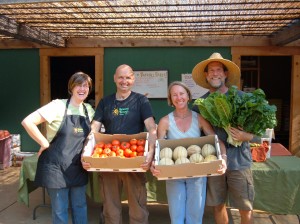Riverhill and Summer Thyme’s are a fresh food team
 COMMUNITY SUPPORTED AGRICULTURE began in the 1960s in Japan, where families wanting safe food and farmers seeking stable markets for their crops formed partnerships.
COMMUNITY SUPPORTED AGRICULTURE began in the 1960s in Japan, where families wanting safe food and farmers seeking stable markets for their crops formed partnerships.
Since then, community supported agriculture, also known as CSA, has spread to America. CSA farms now total more than 1,300, stretching from the West Coast to the Midwest to New England, according to the U.S. Agriculture Department.
Community supported agriculture is booming in the Sierra foothills, where farms sell fruits, vegetables and herbs to consumers and restaurateurs.
The benefits of CSA are exemplified in a partnership between Riverhill Farm in Nevada City and Summer Thyme’s Bakery and Deli in Grass Valley, just five miles apart. The two business owners—who met at the Nevada City Farmers Market—have joined forces to bring fresh, local produce to consumers from June to October.
“People used to know where their food came from, and it tasted better,” says Amy Cooke, who owns Summer Thyme’s with her husband, Chamba. “We believe strongly in bringing some of that back.”
Adds Chamba, “The whole notion of supporting an economy within your area is healthier.”
Every week, the Cooke’s visit Riverhill Farm, on flat terrain overlooking the Yuba River canyon, to find out what’s fresh and help plan their menus.
Summer Thyme’s Mediterranean salad, a popular item, includes fresh tomato, basil and cucumbers from Riverhill. A Rainbow salad is made with fresh chard, cucumbers, peppers and basil from the farm.
“It’s kind of a dance we do every week,” Amy says.
A sign at Summer Thyme’s informs customers that the food comes fromRiverhill and what’s fresh. Expensive restaurants— starting with Alice Waters’ Chez Panisse— have long advertised fresh, local food on their menus, so extending the practice to a cafe where a typical check is less than $10 is a culinary breakthrough.
Riverhill also likes the arrangement, because it creates a stable market—one of the biggest challenges for farmers besides the weather.
“It’s good to see people from so many walks of life supporting local agriculture and receiving the benefits of fresh produce,” says Alan Haight, who owns Riverhill with his wife, Jo.
The couple, who bought the land eight years ago, now grows 40 crops per season on six acres. The seasonal fruits and vegetables all are sold within 10 miles of the farm. Besides restaurants, individuals and families sign up for weekly pick-up or delivery of produce in boxes.
A regular visit to a CSA farm is becoming a fun family outing throughout the country.
Children are always welcome.
A weekly delivery, or share, at Riverhill costs $550 for a 20-week season. Half of the share price is paid upfront, providing needed capital for the farms to plant their crops.
In return, people wind up receiving about $35 to $40 worth of vegetables per week for less than $28, according to Haight.
“That’s how we express our appreciation,” he says.
This year, Riverhill sold 160 shares, up from 60 three years ago.
Riverhill also is extending weekly deliveries to lower-income families, thanks to a $2,500 grant from First Five of Nevada County, which distributes money to support child development.
In the area, Mountain Bounty Farm, Four Frog Farm, Living Lands and Fulcrum Farm also are operated as a CSA.
Besides providing farm fresh produce, CSAs strengthen a sense of community.
“It’s a pleasure to see how local agriculture can help bridge the gaps in our culture and provide a basis for sharing common values,” Haight says.
